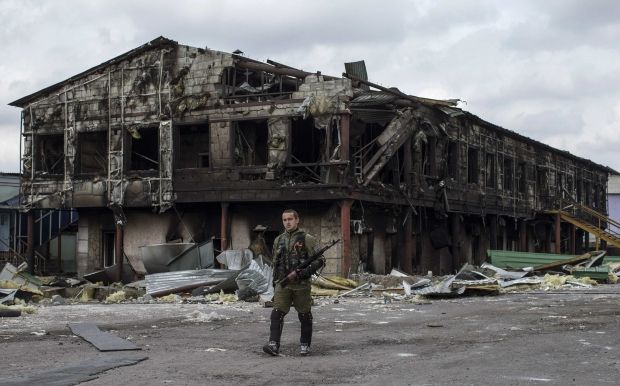
Russia defied international opprobrium to recognise the "election" results, revealing the weakness of the EU and the OSCE, which have not widened sanctions against Russia but restricted themselves to diplomatic protests as Russia continues to flout Ukraine’s territorial integrity and the Minsk Accords.
Five "humanitarian convoys" (seven as of the time of publication here) have crossed into Ukraine without Ukrainian or ICRC authorization, while the OSCE has failed to prevent huge convoys of Russian forces and equipment crossing the border. Over the weekend, 50 trucks crossed into Donetsk from Russia. Russia has 15,000 troops in the DNR and LNR and is training a similar sized separatist force, according to the Ukrainian National Security and Defence Council.
The EU and OSCE have a poor track record in previous frozen conflicts, where they merely added a fig leaf of legitimacy to Russia’s "peacekeeping" occupations. Russia is ignoring the September Minsk accords in the same manner as it flouted the agreement brokered by the EU in 2008 on Georgia. Now, as then, there have been no consequences for Russia.
For instance, on November 14, a Russian crew will take control of the Vladivostok, one of two Mistral warships built in St. Nazare, France. President Nicholas Sarkozy signed the contract for the two vessels in 2011, four years after Russia invaded Georgia.
Following the "election" Ukraine’s options are two-fold:
One is to accept offers from Croatia and others to re-train and advise Ukrainian security forces with a view to undertaking a military offensive to recapture territories annexed by Russia. In 1991, Yugoslav-Serb forces defeated the Croats but five years later, following huge support from their diaspora and covert U.S. and other western military support, the new Croatian forces defeated Serbian separatists and ended three frozen conflicts.
Ukraine’s diaspora is dominated by professionals rather than businessmen and therefore has fewer financial resources than the more business oriented Croatian diaspora. Western military support is also less forthcoming, although the United States has begun some training of Ukrainian forces and the next U.S. President, whether Democrat or Republican, will back the U.S. Congress in providing military assistance.
A second option advocated by Rutgers Professor Alexander Motyl is to abandon the Donbas enclave. The "elections" have entrenched the partition after five months of brutal fighting that has claimed at least 2,000 Ukrainian military dead, wounded and missing, an unknown number of separatists, up to 400 dead and missing Russian soldiers according to Russian NGOs, 3,000 civilian deaths and a million people who have fled their homes.
Accepting the demarcation line as the new Russian-Ukrainian border would be politically difficult for Petro Poroshenko, Ukraine’s president, because of opposition from nationalists and volunteer National Guard battalions, some of whose leaders have been elected to parliament. At the same time, many Ukrainian intellectuals such as Mykola Riabchuk and Yuriy Andrukhovych back Motyl’s call for ditching the Donbas enclave and would be backed by the majority of Ukrainians if the question were put to a referendum. In western Ukraine there are growing calls not to send "our boys" to die fighting for Ukrainians who loath them as a result of Ukrainian military tactics and of the local population buying into Russian television propaganda that portrays Ukraine as a U.S. puppet state run by fascists.
Accepting the current demarcation line as Ukraine’s new border with Russia would accomplish two objectives.
First, the frozen conflict zone would become Russia’s problem, as would the huge cost of rebuilding destroyed and damaged property and infrastructure. Moscow would no longer be unable to use the frozen conflict to influence Ukrainian policies.
Second, without the Crimea and Donbas enclave, public sentiment against European integration would become minimal. This has already changed the political dynamic leading to the election of Ukraine’s first pro-European constitutional parliamentary majority. Ukraine’s president, parliament and government could focus on long-overdue reforms and fighting high-level corruption towards the goal of European integration.
Russia, by annexing Crimea and recognizing the Donbas "elections" has scored an own goal. This is the reason why Ukrainians joke that a monument should be unveiled to Vladimir Putin in Kyiv as a thank you.
Taras Kuzio is a research associate at the Centre for Political and Regional Studies, Canadian Institute for Ukrainian Studies, University of Alberta and non-resident fellow at the Center for Transatlantic Relations, School of Advanced International Relations, Johns Hopkins University.
This article first appeared on November 4 as an FT Blog guest posting. It is republished here with the permission of the author.

